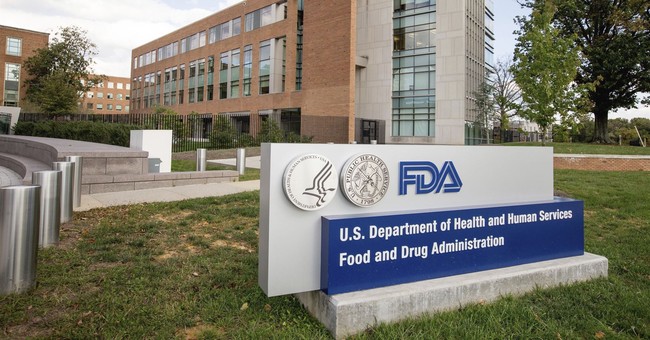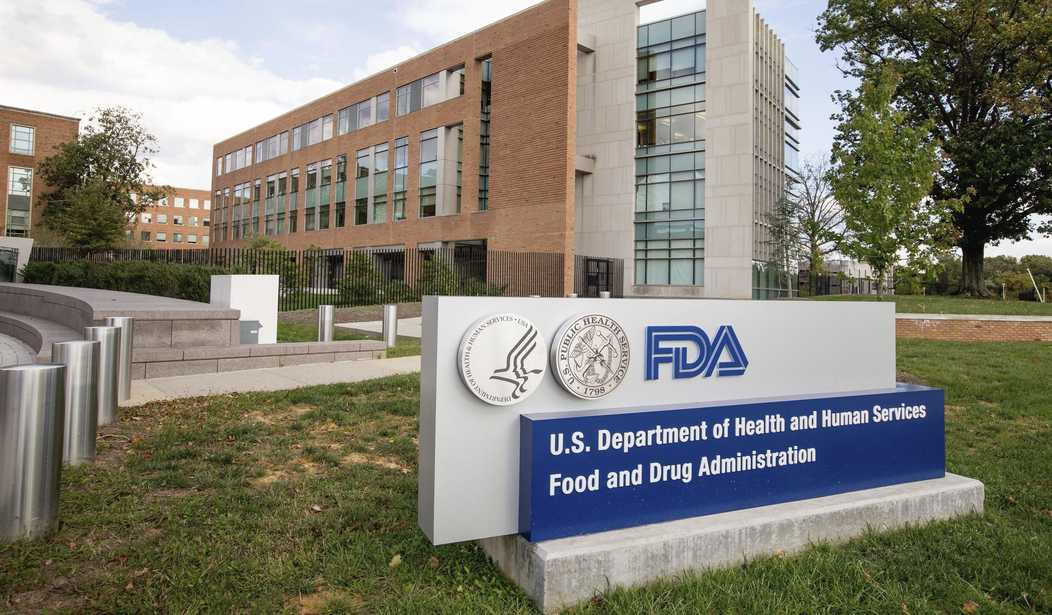
FILE – This Oct. 14, 2015, file photo shows the Food and Drug Administration campus in Silver Spring, Md. The Food and Drug Administration is considering easing the process for drugmakers to get approval to sell some prescription medicines over the counter, a move to offer consumers convenience and lower prices. FDA Commissioner Dr. Scott Gottlieb said Tuesday, July 17, 2018 that the agency has developed tentative guidelines for drugmakers to do so, while maintaining safety standards. (AP Photo/Andrew Harnik, File)
If there is any sort of a silver lining in the aftermath of the Wuhan virus thrashing our economy and reducing the progeny of the men and women who conquered the wilderness, beat the British in two wars, destroyed slavery, and eradicated the Axis to sniveling, hand-scrubbing, bemasked serfs, it may very well be that the role and basic competence of some federal agencies will be examined in excruciating detail.
At the center of just about every delay and misstep in this sorry saga, one does not find politicians or even political appointees, rather one finds the incompetent, turf-conscious, implacable bureaucrats in two of the agencies directly responsible for public health: the CDC and the FDA. In particular, the FDA seems to be at ground zero as a lackadaisical workforce used to being kowtowed to by Pharma and the medical device industry suddenly found itself under intense pressure to at least pretend it cared about what it was supposed to be doing.
This is a great thread that lays out the critical missteps by both the CDC and FDA. I don’t agree with some of the views this guy has. For instance, testing at the early stages of this crisis took about 5 days to get results, making it less data than a Trivial Pursuit answer. But the overall picture he paints is not only accurate but damning:
2/ The first coronavirus case in the US and South Korea was detected on January 21.
South Korea quickly ramped up widespread testing.
Why did the US fail to do the same?
In short: the FDA dropped the ball. pic.twitter.com/v8dKbGzO7x
— Alec 🌐 (@AlecStapp) March 20, 2020
4/ HHS Secretary Alex Azar declared a public health emergency on Jan 31.
That action initiated a new requirement — labs that wanted to conduct their own coronavirus tests must first obtain an emergency use authorization (EUA) from the FDA. pic.twitter.com/PzjYwbgeVv
— Alec 🌐 (@AlecStapp) March 20, 2020
6/ And obtaining an EUA was no easy task.
FDA required:
– validation by testing at least five known positive samples
– mailing a physical application on CD or thumb drive
– testing the protocol against MERS and SARS viruses pic.twitter.com/3PO1xPvITa— Alec 🌐 (@AlecStapp) March 20, 2020
8/ And then they dropped the basket and all the eggs broke.
The CDC protocol failed when state and local public health labs tried to validate it.
The exact cause of failure is still under investigation, but a faulty reagent is suspected. pic.twitter.com/2DW9VMHFSX
— Alec 🌐 (@AlecStapp) March 20, 2020
10/ But this exemption applied only to “laboratories that are certified to perform high-complexity testing consistent with requirements under CLIA.”
One researcher estimated 5,000 virology labs in the country met this standard.
Context: US has ~260,000 laboratory entities.
— Alec 🌐 (@AlecStapp) March 20, 2020
12/ The FDA did the right thing when it expanded the EUA exemption to all labs and manufacturers and devolved regulatory oversight to the states.
The Department of Health and Human Services did the right thing when it waived certain provisions of the HIPAA Privacy Rule.
— Alec 🌐 (@AlecStapp) March 20, 2020
14/ Instead, in this crisis, the FDA bet big on a single testing protocol from the CDC and burned its ships.
And when the “perfect” test failed spectacularly, everyone was left wishing for a way to retreat.
— Alec 🌐 (@AlecStapp) March 20, 2020
Over and over, you see President Trump and political leadership at federal and state level stepping in to remove barriers to clinical trials, to agitate for therapies that seem to have been proven in use in Europe to be pushed to the head of the line (here I’m talking specifically about the combination of hydroxychloroquine and the antibiotic Zithromax that Trump has touted and now is undergoing a massive clinical trial at the direction of New York Governor Andrew Cuomo), promising tests were moved to the head of the line and the way cleared for home testing by major commercial labs.
One would think this public shaming would have galvanized the FDA into action and inspired them, in Twitter SJW vernacular, to ‘do better.’ You would be wrong.
At this very moment, stockpiles of masks, hand sanitizer, and other supplies are sitting in warehouses waiting for FDA inspectors to get around to them. Where other nations are expediting these deliveries, trusting proven suppliers in their deliveries, the FDA has resorted to its favorite fetish: bureaucratic lethargy.
The problem here is not simply that the FDA is insisting that its box-checking comes before exigent needs of public health, but also that the agency doesn’t have enough inspectors to get the job done quickly.
I spoke to one significant medical supplier who talked to me on the condition of anonymity, for fear of FDA retaliation. In one location on the Pacific coast, this supplier has had more than 20 pallets of coronavirus-specific medical supplies waiting in a warehouse for five days. Yes, five days.At another depot in the south-central United States, this same supplier has had 500,000 level-three or level-four masks sitting in a warehouse for two days now. They expect the FDA delays to continue indefinitely.
And get this — some of what the supplier is delivering is supposed to be gifted to a hospital. But even in that case, the FDA has warned that the supplies cannot even be unpacked until an inspector arrives. If they are broken down before then, even if only to expedite delivery once the inspector’s approval is given, fines are threatened to follow.
The FDA has a role in keeping the medical supply chain safe and ensuring devices and drugs are effective. It is not, however, a gatekeeper. And in times like this, it must work hand-in-glove with industry and research facilities to ensure things that work get to the public fast while making sure snake oil gets stopped. Right now, the FDA seems to have a business as usual attitude and they are in urgent need of a ‘tune up’ by President Trump.














Join the conversation as a VIP Member